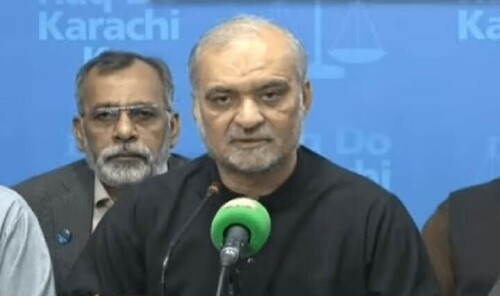THATTA: Most communities living in the Indus delta are faced with food insecurity and have lost their livelihood resources.
This was stated by speakers at a seminar titled ‘Enhancing awareness and engagement of youth towards addressing coastal climate vulnerability and gender empowerment’ organised by the WWF-Pakistan in collaboration with Sindh University at the latter’s Thatta campus.
They said natural disasters, including coastal flooding and frequent cyclones, posed a serious threat to the fragile deltaic ecosystem and damage infrastructure in the delta.
The speakers emphasized on empowering and engaging youth in research studies and application of nature-based solutions to address climatic challenges.
Experts stated that in the current era, climatic changes were occurring on a larger scale and with more frequency. Not only were wild plants and animals at risk, but people were also the victims of the deteriorating state of nature.
Speaking on the occasion, SU Thatta campus Pro-Vice Chancellor Dr Rafique Ahmed Memon said that despite its global ecological significance, the Indus delta was the most vulnerable to climate change impacts and was at a greater risk of degradation.
He said that a decrease in river water flow had led to reduction in sediment deposition, seawater intrusion, land-use changes, sea-level rise and disappearance of various deltaic fish species.
He urged that adequate flow of water should be released in the Indus delta as it was essential for the local population and the deltaic ecosystem. “With awareness raising and education campaigns, we should work towards conservation of coastal resources which are lifeline of the people,” he remarked.
Hamera Aisha, WWF-Pakistan manager conservation, said the coastal belt of Sindh was highly prone to climate change-related disasters. Due to loss of livelihood resources, local people were migrating to other cities and towns, which was putting pressure on urban populations, she said.
Dr Mukhtiar Ahmed Mahar, Thatta campus director of coastal and deltaic studies, said that in the past, the Indus delta received adequate freshwater flows from the Indus River throughout the year, which was now limited to only one or two months causing environmental degradation and negatively impacting traditional livelihoods, survival and resilience patterns in the presence of high levels of social inequality.
Saeedul Islam, WWF-Pakistan manager of mangroves conservation project, briefed the participants about climate-related challenges and shared progress on the mangroves conservation initiative and community engagement in the Indus delta.
Published in Dawn, July 17th, 2021













































Dear visitor, the comments section is undergoing an overhaul and will return soon.